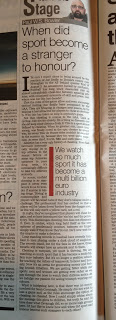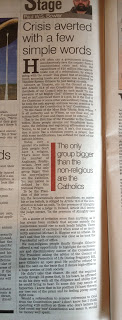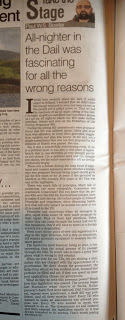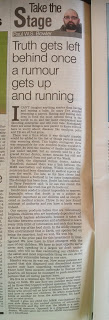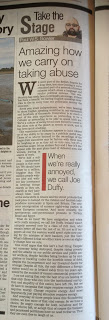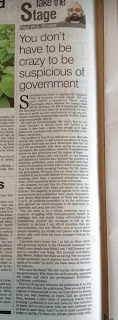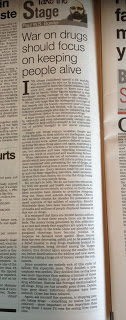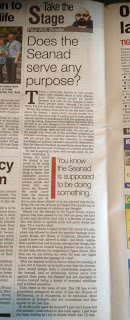My column in The Kerryman. 14 August, 2013
I’m sure I wasn’t alone in being amazed by the reaction of Joe Brolly to Tyrone’s victory over Monaghan in the All Ireland quarter final of August 3. An amazement fueled by confusion. Football has long since descended into an almost unwatchable cheat-fest between amazing athletes, with occasional moments of skill and grace. Just where was Joe this last decade?
That the rules of the game allow and even encourage tactical fouling, has finally been recognised by the GAA. They are bringing in changes next season, to try making it less attractive for players to cheat so obviously. Why this has taken so long is anybodies guess.
Not that cheating is unique to the GAA. Look at cycling. Just not too closely. It’s a thing so diseased, one should keep some distance from it. This is a sport almost defined by cheating. When its greatest star, Lance Armstrong, was finally outed as the epic cheater he always was, his seven Tour de France titles couldn’t be awarded to the runners up, because they too were under suspicion. As were third, fourth, fifth and sixth places.
Athletics has a very ugly history of cheating. From East Germany systematically ‘doping’ its to top athletes to the recent failure of some top Jamaican sprinters to pass drug tests, it’s increasingly difficult to take top athletics seriously.
In soccer, on-field cheating is so rampant it never even occurs to us to wonder if anyone is taking drugs. ‘Diving‘ is commonplace and players will be called naive if they don’t collapse under a challenge. The professional foul has evolved, so that a player will be ‘taken down’ further from the danger area, as this will only merit a yellow card, not a red.
In rugby, they’ve recognised that players will cheat for gain, and so have introduced the ‘sin bin’ and the penalty try. This discourages cheating, but does not eliminate it. Even in cricket, which long held itself as the very epitome of gentlemanly conduct, batsmen no longer simply walk if they know they’re out. He’ll now wait for the umpire to make a decision.
Long standing records in baseball have recently tumbled to men playing under a dark cloud of suspicion. The records stand, but for the fans in the know, those records will always have an asterisk next to them.
Cheating is rampant, yet sport is thriving. We are watching so much of it that it has become a multi-billion euro industry. But it’s no longer a positive vehicle for teaching the values of teamwork, honour and honesty. Now it’s an arena for generating money and fueling brutish tribalism. We are getting fatter while our sports men and women are getting ever richer as we pay through the nose to watch their dubious antics. As we indulge our passion for seeing triumph wearing our colours.
What is intriguing here, is that there was no money involved for Sean Cavanagh. He simply did not wish to lose a game, and as the rules encourage the option of cheating, he cheated. Now I could simply whine about the message this gives to children, but truth be told I’d have done what Cavanagh did, so no moral high-ground here. I’d just like to know how and when did sport and honour become such strangers to each other?
